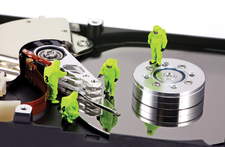Mass storage and data management with Parted Magic
Disk Aid

© Lead Image © Amy Walters, 123RF.com
It's really annoying when a disk suddenly dies on you or a typo in a command deletes important data. The free Parted Magic Live distro offers help.
The explosion of hard disk capacities in recent years, coupled with the ever-improving multimedia capabilities of conventional computer systems, has led to massive growth in volumes of data in many households. But HD video, lossless audio files, and elaborate games force you pay more attention to backing up your data. Many naive users invest in expensive, commercial software, often accompanied by a yearly subscription fee, to create backups of their mass storage.
However, the Parted Magic Live distribution [1] gives you a permanent answer to backup problems. Parted Magic bills itself as "a complete hard disk management solution." The Live system comes with a collection of useful tools for partitioning, backup, disk cloning, data rescue, and more. Although the maintainer has recently asked for a contribution to help finance the GPL-licensed distribution, the price of just under US$ 5 is something anyone can afford.
Variants
Parted Magic offers several start options in the GRUB boot manager. If you use the operating system on an older machine with only 512MB of RAM, choose the Start option Live with default settings 32 (for 32-bit machines) or Live with default settings 64 (for 64-bit PCs).
[...]
Buy this article as PDF
(incl. VAT)
Buy Linux Magazine
Subscribe to our Linux Newsletters
Find Linux and Open Source Jobs
Subscribe to our ADMIN Newsletters
Support Our Work
Linux Magazine content is made possible with support from readers like you. Please consider contributing when you’ve found an article to be beneficial.

News
-
Chaos Comes to KDE in KaOS
KaOS devs are making a major change to the distribution, and it all comes down to one system.
-
New Linux Botnet Discovered
The SSHStalker botnet uses IRC C2 to control systems via legacy Linux kernel exploits.
-
The Next Linux Kernel Turns 7.0
Linus Torvalds has announced that after Linux kernel 6.19, we'll finally reach the 7.0 iteration stage.
-
Linux From Scratch Drops SysVinit Support
LFS will no longer support SysVinit.
-
LibreOffice 26.2 Now Available
With new features, improvements, and bug fixes, LibreOffice 26.2 delivers a modern, polished office suite without compromise.
-
Linux Kernel Project Releases Project Continuity Document
What happens to Linux when there's no Linus? It's a question many of us have asked over the years, and it seems it's also on the minds of the Linux kernel project.
-
Mecha Systems Introduces Linux Handheld
Mecha Systems has revealed its Mecha Comet, a new handheld computer powered by – you guessed it – Linux.
-
MX Linux 25.1 Features Dual Init System ISO
The latest release of MX Linux caters to lovers of two different init systems and even offers instructions on how to transition.
-
Photoshop on Linux?
A developer has patched Wine so that it'll run specific versions of Photoshop that depend on Adobe Creative Cloud.
-
Linux Mint 22.3 Now Available with New Tools
Linux Mint 22.3 has been released with a pair of new tools for system admins and some pretty cool new features.
